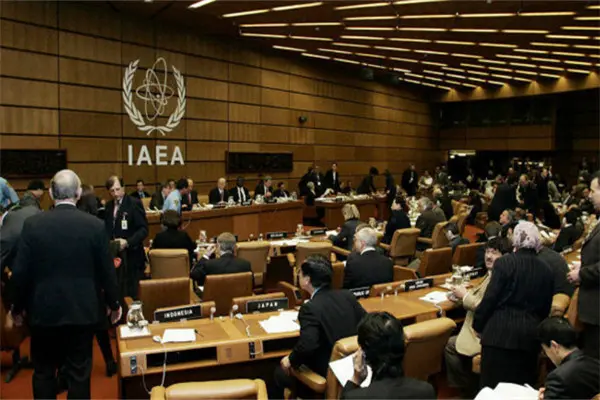The Islamic republic officials and the visiting delegation of the International Atomic Energy Agency (IAEA) discussed here on Sunday a range of issues pertaining to the implementation of Iranian nuclear deal, known as JCPOA, and Iran-IAEA cooperation in technical and safeguard aspects, as well as Iran's program for nuclear-powered boats.
"The two had discussed a range of issues, including heavy-water, enriched uranium, Iran's uranium stockpiles as well as research and development in the field of nuclear energy," IAEA Chief, Yukiya Amano, said in joint press conference with Head of the Atomic Energy Organization of Iran (AEOI) Ali Akbar Salehi.
Among other topics in the talks was a recent order by President Hassan Rouhani to the AEOI to plan a work on nuclear propulsion devices to be used in sea transport, Amano was quoted as saying by Press TV.
Also, Salehi said that his talks with Amano on Sunday revolved around Rouhani's recent order for reaction to the U.S. "violation of the JCPOA," after the U.S. legislators passed a bill extending Iran Sanctions Act (ISA) for 10 more years.
The earlier vote by the U.S. House of Representatives to extend the ISA was endorsed by the Senate last week.
The White House said in a statement on Thursday that the bill renewing the ISA was becoming law without U.S. President Barack Obama's signature.
The White House said that an extension of the bill "is entirely consistent with" the U.S. commitments in the Iran nuclear deal reached in July 2015.
The ISA was first adopted in 1996 to sanction Iran over its controversial nuclear program.
In a letter to Salehi on Tuesday, Rouhani said that "The United States has not fully delivered its commitments in the JCPOA," asking Iranian nuclear scientists to start developing systems for nuclear-powered boats in marine transportation.
In the letter, he also demanded the Atomic Energy Organization of Iran to plan for designing and manufacturing nuclear propeller to be used in marine transportation with the help of scientific and research centers.
Also, they need to conduct study and design production of fuel to be used by the nuclear propeller with the help of scientific and research centers, the letter read.
Tehran "is ready to take whatever proportionate measure upon the decision of the Iranian establishment's authorities" over the other party's dishonor of its commitments, Salehi was quoted as saying by the report.
Enrichment of uranium to run the nuclear propellers may vary from a purity of five percent to 90 percent, depending on its type, the purpose and the time available, Salehi said, stressing that all such activities will be carried out in conformity with the Safeguard Agreements.
The Iranian nuclear chief also denied that Amano has passed on a message from the United States to the Iranians, Tasnim news agency reported.
He also pointed out that the IAEA should remain an impartial and independent body without coming under the influence of any party.
As for Iran's performance of its obligation's vis-à-vis the nuclear deal, Amano said that "Iran has been committed to its obligations and this is an important matter," according to Press TV.
"We are satisfied with the trend of the JCPOA's implementation, and hope for this trend to continue," the IAEA director general said added.
The IAEA is tasked with monitoring the technical implementation of the nuclear deal.
On Sunday, Iran's Rouhani also urged the IAEA "to perform its responsibility in the area of technical cooperation (with Iran) and the transfer of peaceful nuclear technology" to the Islamic republic.
"The Islamic Republic will honor its commitments as long as other parties honor theirs," Rouhani said in a meeting with Amano.
He criticized the recent move by the United Sates over the extension of the ISA, saying that "The course the United States has taken vis-à-vis Iran will lead to the reduction of international confidence in the U.S. government."
For his part, Amano said that "The JCPOA was a big achievement, whose implementation the IAEA will support with all its might."
This is the second visit by the head of IAEA to Tehran following the clinch of the nuclear deal between Iran and the world powers in July 2015 and its implementation in January.
The deal between Iran and six world major countries, namely the United States, Britain, China, Russia, France and Germany, on the former's nuclear issue put Iran on the path of sanctions relief but more strict limits on its nuclear program.
The deal sets limits on Iran's nuclear activities and allows regular inspections of the facilities inside the Islamic republic.
In return, the U.S. and the European Union will suspend nuclear-related sanctions against Iran.
(APD)
 简体中文
简体中文





